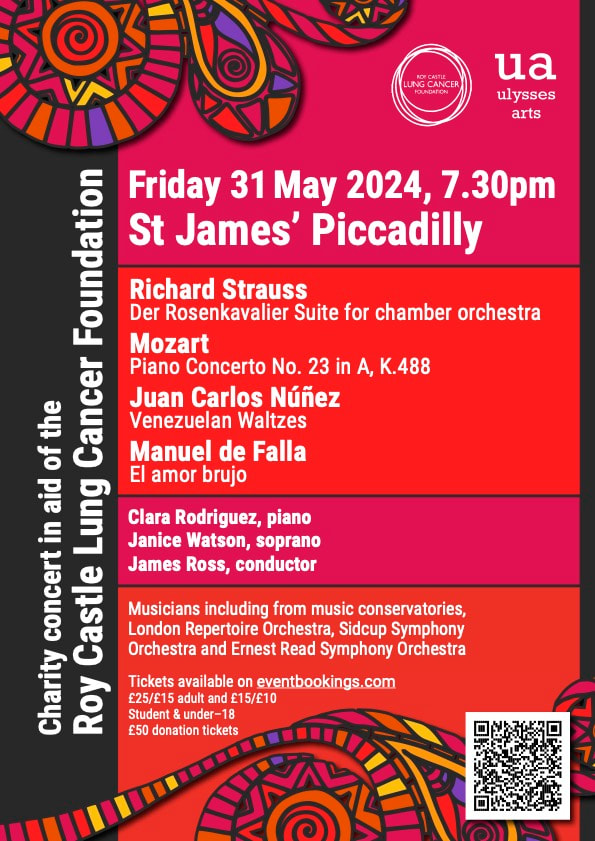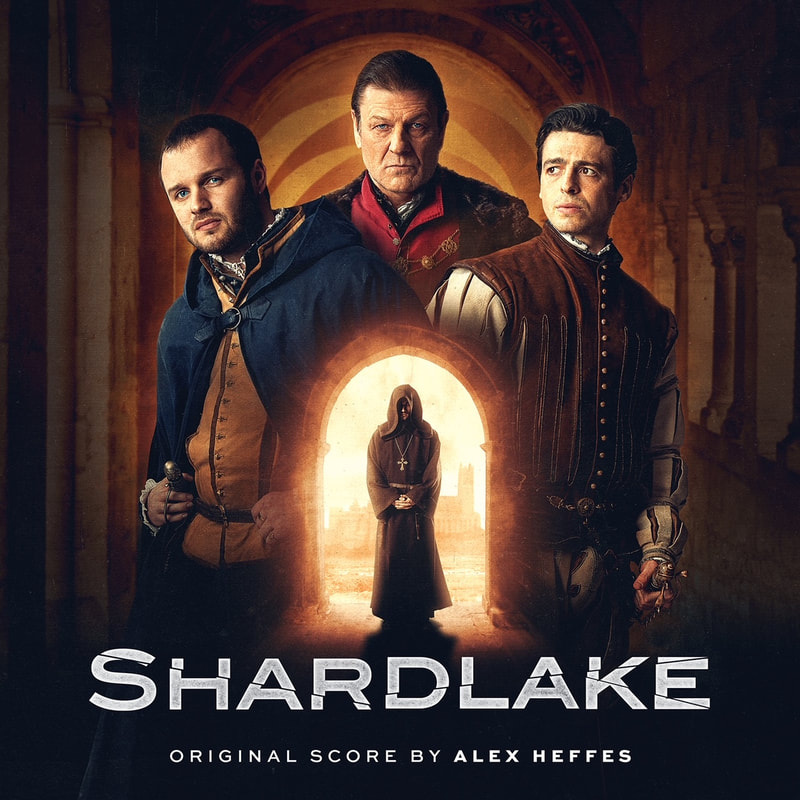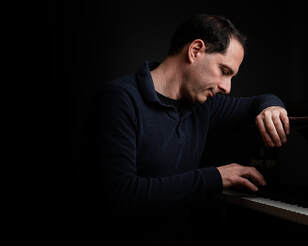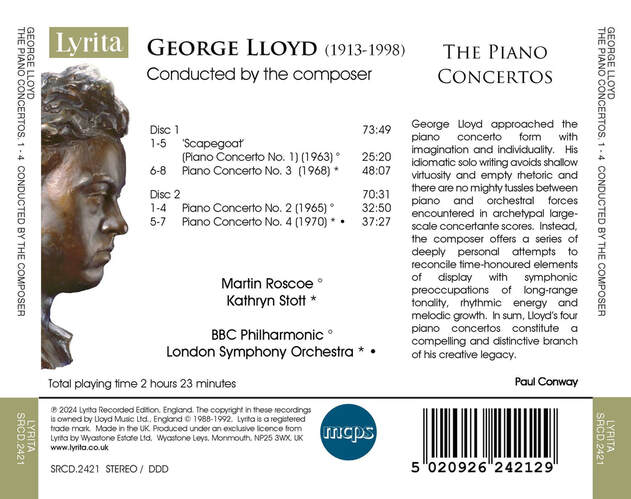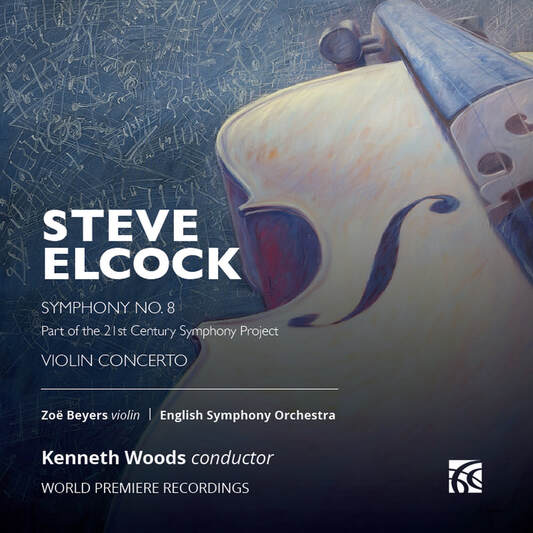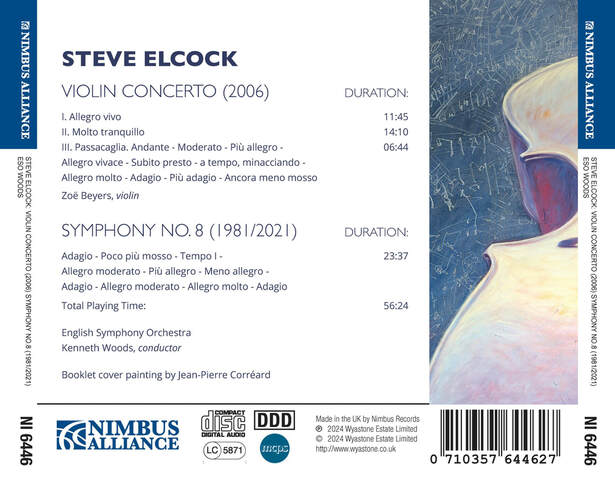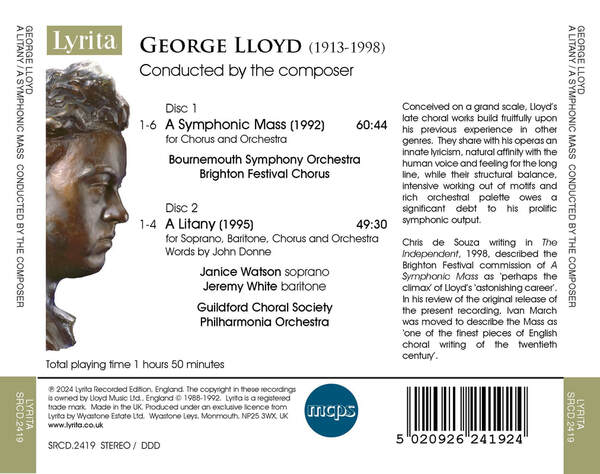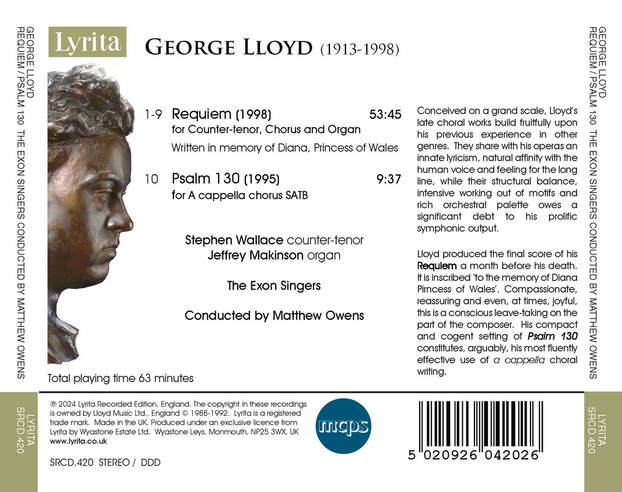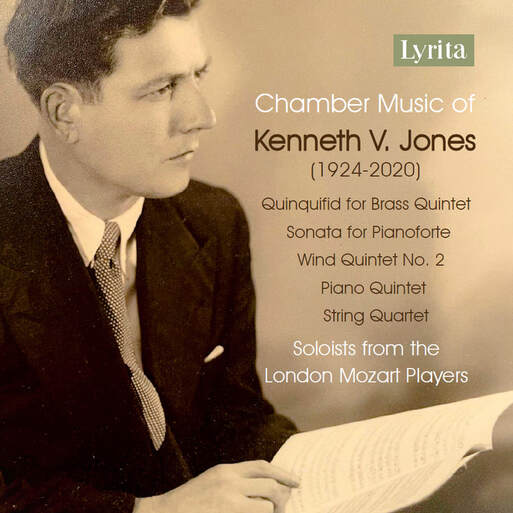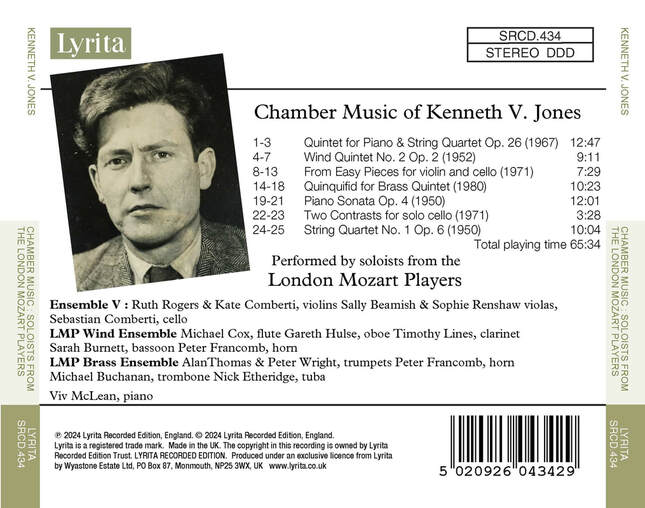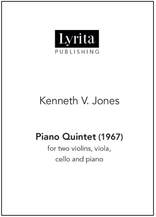
The Roy Castle Lung Cancer Foundation is the UK's leading lung cancer charity dedicated to helping everyone affected by the disease. Since 1990, when set up by Professor Ray Donnelly, it has funded millions of pounds of essential lung cancer research, looking for ways to detect the disease as early as possible and save lives.
The Foundation supports everyone affected by lung cancer – from diagnosis, through treatment, living with the disease and end of life care. It raises awareness, prevents future generations from getting lung cancer and challenges misconceptions about it, so those diagnosed can live well with lung cancer for as long as possible.
The concert on 31 May includes members of Sidcup Symphony Orchestra, whose constituency MP James Brokenshire died from lung cancer in 2021. From his initial diagnosis in 2017 until his death, James was an indefatigable campaigner for better lung cancer screening, becoming the first MP to host a debate on it in the House of Commons. He was determined that the misconceptions surrounding lung cancer should be removed.
Read more at https://roycastle.org/james-brokenshire-one-year-on-a-life-well-lived/

arr. H.H. Higgs for chamber orchestra
Der Rosenkavalier (1911) is Richard Strauss’s best-loved opera. Set in the Vienna of 1740, its comic surface only heightens the opera’s exploration of heartfelt – and heartbreaking – human feelings. We see love at first sight between the youthful Octavian, the seventeen-year-old ‘Rose Knight’ of the title – a female ‘trouser role’ – and Sophie, naïve and fresh from the Convent, the boorish wooing ‘skills’ of Baron Ochs, the social ambitious of Faninal, a nouveau riche arms dealer, and most poignantly, the Marschallin’s renunciation of Octavian’s love faced with his choosing a younger woman. The opera’s comic face is wrinkled with nostalgia for a bygone era that never was. Musically it is permeated with the rhythms and melodies of the Viennese waltz, which became popular only in the Nineteenth Century, decades after the story takes place.
The Suite begins with the introduction to Act One – depicting the youthful Octavian paying court vigorously to the Marschallin in her boudoir – before moving through a sequence of the opera’s greatest moments, including Octavian’s ‘Presentation of the Rose’ (chosen for this task – most unwisely – by the aptly-named boorish Baron Ochs) to Sophie and their instant falling in love, the heavy footsteps and hesitant waltz that accompanies Och’s comic entrance to the Marschallin’s house. In this music from the final trio, Octavian, Sophie and the Marschallin express their starkly different feelings with supreme passion and poignancy, before finally a dazzling quick waltz sequence and grand concert ending.

Clara Rodriguez, piano
I. Allegro - II. Adagio - III. Allegro assai
Mozart completed this Concerto while composing his opera The Marriage of Figaro in the winter of 1785-86, although its conception might have dated back several years. It was one of Mozart’s favourite works: he described it amongst those ‘compositions that I keep for myself or for a small circle of music lovers and connoisseurs (who promise not to let them out of their hands)’. The music’s seemingly effortless fluency belies much hard work: Mozart rejected his initial sketches for a second movement in D major, and tried numerous openings to the third movement before settling on the final version.
The Concerto’s scoring is unusual: clarinets, still not standard members of the orchestra, replace oboes; they blend ingeniously with flute, bassoons and horns to create a wind ensemble able to interact autonomously with the soloist and strings. The first movement offers three themes within an atmosphere dominated by charm and geniality, which should never be mistaken for lack of depth and musical substance. The solo cadenza near the end is Mozart’s own.
The Adagio is a slow lilting sicilienne in F-sharp minor, the only time Mozart uses this key. The Concerto’s expressive heart, this of music of sublime intimacy and sensitivity, with wide leaps, expressive sighs, descending sequences of semitones and unexpected silences. At every return of the opening piano theme, the music brings us to new and deeper perspectives. Near the end, the sicilienne hollows out into sparse string pizzicato notes with single notes from the piano, before a final elegiac farewell to the opening theme. The Finale’s mood is close to The Marriage of Figaro, a magnificent instrumental evocation of ‘opera buffa’, its themes behaving like a cast of extrovert stage characters. James Ross
Juan Carlos Núñez (arr.), Anthology of Venezuelan Waltzes
Rafael Saumell (1830-unknown), Vals Venezolano
Juan Carlos Núñez (1947-), Retrato de Ramón Delgado-Palacios
Ramón Delgado-Palacios (1867-1902), Mi Aplauso
Luisa Elena Paesano (1941-2019), Pajarillo
This selection of works represents the richness of Venezuelas’s musical heritage, beginning with Mi Teresita Waltz by Teresa Carreño (Caracas 1853- New York 1917), composed in 1884 to accompany the first dance steps by her daughter Teresita. Faced with a euphoric audience and having run out of encores, Carreño decided to perform Mi Teresita in public for the first time. It was an immediate success: she played it hundreds of times to end her concerts.
Venezuela’s waltz tradition is deeply ingrained deeply in the national culture. Influenced initially by Viennese tradition, Venezuelan waltzes evolved their own distinctive characteristics. Typically, their rhythm features a dotted crotchet followed by a quaver and another crotchet. The structure follows an A-B-A form: the 'A' section presents an elegant melody at a moderate tempo, while the middle 'B' section is played faster.
Juan Carlos Núñez (Caracas 1948-) is a composer and conductor with a passion for both popular and classical music. He has arranged famous waltzes from the late 19th and early 20th centuries for piano and string orchestra, which I had honour of premièring in Caracas. Tonight, we perform Vals Venezolano by Rafael Saumell, followed by Autorretrato de Ramón Delgado-Palacios. Here Núñez uses Delgado-Palacios’s own musical self-portrait, reflecting his tormented and melancholic life with atypical harmonies and a jazzy solo cadenza, followed by one of Delgado-Palacios' happiest compositions, Mi Aplauso.
To conclude this segment of the concert, I will perform Pajarillo by Luisa Elena Paesano (1946-2019). This vibrant composition is inspired by the pajarillo style of ‘joropo’ from the Venezuelan plains. Adding a special touch to this performance, Wilmer Sifontes will join me, playing the maracas. Clara Rodriguez

Manuel de Falla (1876-1946)
El amor brujo: Ballet pantomímico
Janice Watson, soprano
Manuel de Falla was born in Madrid, but his deepest inspiration came from Andalusia. In 1914, World War One’s German invasion of France forced Falla to return to Spain from Paris, where he studied and was building an international reputation. For many composers, war suspended or greatly curtailed their creative work; for Falla, these were the most productive years of his life, creating his Nights in the Gardens of Spain for piano and orchestra, The Three-Cornered Hat ballet, and at the invitation of famous flamenco singer Pastora Imperio, El Amor brujo.
The first version, first performed in Madrid in 1915, was a ‘gitanería’ for Gypsy dancers, actors, flamenco cantaora singer and chamber ensemble of fifteen musicians. A second version, made in 1916, removed the spoken dialogue, enlarged the orchestration and adapted the vocal part; the final and best-known version from 1925 was a one-act ‘ballet pantomímico’, first performed in Paris.
The story of El amor brujo tells of an Andalusian widow struggling to free herself of her former husband’s ghost and find love again through a night of enchantment, recitations and ritual dances. According to the final ballet scenario:
‘Candelas, a beautiful young gypsy, is courted by Carmelo and wants to respond to his love, but the Spectre of her first lover, a jealous, dissolute and faithless Gypsy, terrifies her and interposes himself between her and Carmelo. He persuades Lucia, a young Gypsy friend of Candelas, to pretend to be in love with the Spectre, and to lure him away until he (Carmelo) has been able to give Candelas “the kiss of perfect love”. Carmelo and Candelas finally exchange the redeeming kiss, and the Spectre is exorcised for ever, ‘conquered by love.’
Falla captures the story’s primitive force, magic and tragedy without sentiment or stylisation. Rather than ‘local colour’ and intellectualised folklore, orchestra and gitanería meet on equal terms. The ‘Ritual Fire Dance’, often performed separately, is Candelas’ unsuccessful first attempt to cast off the Spectre, with which she dances every night and remains obsessed with her soul. The ‘Will-O’-the-Wisp’ song inspired the second track of Miles Davis’s 1960 jazz Sketches of Spain album.
Unlike the first Madrid production, whose radical novelty confused its audience, the final 1925 ballet version was a triumph. According to French critic Roland-Manuel: ‘Despite all its dazzling finery, I know of no music more purely, more sanely musical than that of Falla, nor of any which possesses a more certain objective value. El amor brujo bears witness especially to Falla’s orchestral genius … surpassed by none.’ James Ross
2. En la cueva - 'In the Cave'
3. Canción del amor dolido – 'Song of Suffering Love'
| ¡Ay! Yo no sé qué siento, ni sé qué me pasa, cuando éste mardito gitano me farta! Candela que ardes ¡Más arde el infierno que toita mi sangre abrasa de celos! ¡Ay! Cuando el río suena ¿qué querrá decir? ¡Ay! ¡ Por querer a otra se orvía de mí! ¡Ay! Cuando el fuego abrasa… Cuando el río suena… Si el agua no mata al fuego, a mí el pesar me condena! ¡A mí el querer me envenena! ¡A mí me matan las penas! ¡Ay! | Ah! I don’t know what I feel, nor what is happening to me – But how I miss this damned gypsy! Fire, that blazes Blazing stronger is the inferno Which burns my blood with jealousy! When the river boils what does it mean? Ah! For the love of another he forgets me! Ah! When the fire blazes, When the river boils… If the water doesn’t kill the flame, then sorrow will damn me! Love is poisoning me! Grief is killing me! Ah! |
4. El aparecido (El espectro) – The Apparition
5. Danza del terror – Dance of Terror
6. El círculo mágico: Romance del pescador – The Magic Circle: The Fisherman’s Story
7. A media noche: los sortilegios – At midnight: the spells
8. Danza ritual del fuego – Ritual Fire Dance
9. Escena – Scene
10. Canción del fuego fatuo – Song of the will-o'-the-wisp
| Lo mismo que er fuego fatuo, lo mismito es er queré. … Le juyes y te persigue, le yamas y echa a corré. ¡Lo mismo que er fuego fatuo, lo mismito es er queré! Nace en las noches de agosto cuando aprieta la calor. Va corriendo por los campos en busca de un corazón… ¡Lo mismo que er fuego fatuo, lo mismito es el amor! ¡Malhaya los ojos negros que le alcanzaron aver! ¡Malhaya er corazón triste que en su yama quiso arder! ¡Lo mismo que er fuego fatuo se desvanece er queré! | Just like the will-o’-the-wisp Is love. … You flee from it and it pursues you, You call it, and it runs away. Just like the will-o’-the-wisp Is love. When the heat bears down it is born in August nights. It runs through the countryside looking for a heart… Just like the will-o’-the-wisp Is love. Damned are the dark eyes that can see it! Damned is the sad heart that wanted to burn in its flame! Just like the will-o’-the-wisp Is love. |
12. Danza del juego de amor ('Dance of the game of love')
| ¡Tú eres aquél mal gitano que una gitana quería! ¡El querer que eya te daba tú no te lo merecías! ¡Quién lo había de decí que con otra la vendías! ¡Anda, mar gaché! Qué te merecías? ¡Que er mismísimo Pedro Botero te abrasara esa lengua conque amor la mentias! ¡No te acerques, no me mires, que soy bruja consuma; y er que se atreva a tocarme la mano se abrasará! ¡Soy la voz de tu destino! ¡Soy er fuego en que te abrasas! ¡Soy er viento en que suspiras! ¡Soy la mar en que naufragas! | You are the evil gypsy that a girl once loved! You didn’t deserve the love that she gave you! Who would have said that you would betray her with another! Go on with you! What do you deserve? The same as you gave her, Pedro Botero: to have that tongue burnt out, that same tongue with which you lied to her! Don’t come close, don’t touch me, I am an out-and-out witch; and whosoever tries to touch my arm will be burned! I am the voice of your destiny! I am the fire in which you burn! I am the wind in which you sigh! I am the sea in which you are shipwrecked! |
13. Final – las campanas del amanecer (Finale – the bells of sunrise)
| ¡Ya está despuntando er día! ¡Venme esta noche a buscar! Veremos si se me orvía lo que me has jecho penar con tanta mala partía! ¡Ya está despuntando er día! ¡Cantad, campanas, cantad! ¡Que vuelve la gloria mía! | Dawn is breaking! Come for me tonight! We’ll see if I forget how much you made me suffer with your dirty trick! Dawn is breaking! Sing, bells, sing! I feel joy returning to me! |

‘Venezuelan virtuoso pianist Clara Rodriguez’ (The Financial Times) has built an enviable international reputation for her innovative programme planning, juxtaposing standard repertoire with works by South American composers. She has commissioned, premièred and is the dedicatee of more than thirty works. Her playing stands out for its sheer beauty of tone, high expressiveness, sensitivity considerable digital clarity combined with stylistic acumen.’
At seventeen she was awarded the Teresa Carreño Scholarship to pursue studies at The Royal College of Music with Phyllis Sellick, where she received numerous awards including the Scarlatti Prize, the Mozart Prize, and the Percy Buck Award, as a finalist in the Chappell Prize. At the RCM she performed concertos by Mozart, Falla and Gershwin. In Caracas, at eighteen she made her orchestral debut Mozart's Piano Concerto K.595 with the Simón Bolívar Orchestra and José Antonio Abreu; her London debut in 1985 was at St. John’s Smith Square, playing Ravel’s Concerto in G.
Before coming to London, pianist Guiomar Narváez was Clara Rodriguez's first teacher. She has also studied with Paul Badura-Skoda (Austria), Niel Immelman (UK), Irina Zaritskaya (Russia) and Regina Smendzianka (Poland).
Clara Rodriguez’s solo career has earned her great acclaim in UK, France, Spain, Italy, Denmark, Finland, Venezuela, the United States, India, Egypt, Syria, and Tunisia. In London, she is a hugely popular performer who regularly plays in recitals and as a concerto soloist in the most prestigious halls including the Southbank Centre, Wigmore Hall, Barbican Centre, St. Martin-in-the-Fields, St. James’s Piccadilly, St John’s Smith Square, Leighton House, Bolívar Hall and the 1901 Arts Club.
She is invited to play concertos with the worldwide acclaimed Simón Bolívar Orchestra, including memorably in the Grandes Virtuosos del Piano Festival, performing Reynaldo Hahn’s Piano Concerto alongside other participants including Paul Badura-Skoda and Chick Corea.
Clara Rodriguez is often interviewed by the BBC; her albums CDs feature regularly on BBC Radio stations and in networks worldwide. She has recorded six solo albums for Nimbus Records including the piano works by Moisés Moleiro, Federico Ruiz, Teresa Carreño, Ernesto Lecuona, Venezuela, and Americas without Frontiers. Two more albums include El Cuarteto with Clara Rodriguez Live, and Frederic Chopin on the Ulysses Arts label.
Represented by Dominic Seligman Agency, Clara Rodriguez regularly plays recitals at Arundells, the Salisbury home of former Prime Minister Sir Edward Heath.
As a pedagogue her students have been awarded numerous prizes in competitions and scholarships to leading universities and music conservatoires, with successful public concerts at Wigmore Hall, the Albert Hall’s Elgar Room and venues throughout the UK. She teaches at the Royal College of Music junior department and is an international adjudicator.
Clara Rodriguez has been awarded the ‘Classical Music Act’ LUKAS Prize 2015, has been made an honorary member of the Chelsea Arts Club and has been named ‘Woman of the Year’ by the main newspapers and magazines of Venezuela. She is the editor of Clifton Editions’ rapidly growing series Venezuelan Treasures for Piano, Clifton Editions, distributed by Stainer & Bell.
Artists and orchestras with whom she has performed include clarinettist and conductor Michael Collins, BBC Symphony Orchestra leader Stephen Bryant, Orchestra of the Age of Enlightenment, Orquesta Sinfónica Simón Bolívar, Sinfónica de Venezuela, Orquesta Filarmónica Nacional de Venezuela, Orquesta Municipal de Caracas, Orquesta Sinfónica de Maracaibo, Orquesta Sinfónica Francisco de Miranda, Orquesta Sinfónica Juan José Landaeta, Phoenix Orchestra, Orquesta de Aragua, Fulham Symphony Orchestras, Camden Symphony Orchestra, conductors Jordi Mora, Marc Dooley, Levon Parikian, Christopher Adey, Eduardo Rahn, Teresa Hernández, Carlos Riazuelo, Alfredo Rugeles, Rodolfo Saglimbeni, Luis Miguel González-Fuentes, Régulo Stabilito, Telésforo Naranjo and Jesús Uzcátegui: www.clararodriguez.com Follow Clara Rodriguez on Spotify
‘The Venezuelan is a doughty champion of Latin-American music, and her programme of piano pieces reaches below and often jaunty surface to capture the region's deeper soul. Plenty is captivating, not least Venezuelan works by Antonio Estévez and Juan Carlos Núñez, while Gershwin's Three Preludes are a class act’. Stephen Pettit, The Sunday Times
‘Venezuelan Clara Rodríguez, one of the most distinguished pianists on the international scene. This distinction is evident especially in the emotional connection she has with Chopin’s music. Rodríguez marks with delicious expressiveness its differences and contrasts while maintaining a perfect balance in the inseparable fusion between form and content. The truth is that the wisdom of Rodriguez’s interpretation, provides to her versions a universal dimension of romantic pianism.’ Marçal Borotau, Sonograma Magazine, Barcelona
‘Clara Rodriguez at the Wigmore Most of what Clara Rodriguez played to a full Wigmore Hall was marked by the sheer beauty of her tone.’ Max Harrison, Musical Opinion
‘Clara Rodriguez provides performances of alluring vivacity allied to that most essential of requisites-charm’. Jeremy Nicholas, Gramophone

Janice Watson is one of the worlds’ major sopranos, renowned for the beauty of her sound. A flautist originally, she began singing seriously at the instigation of tenor Philip Langridge. She studied firstly with Johanna Peters at London’s Guildhall School of Music and Drama, then with Renata Scotto. There followed a period at the Ravel Institute in Ciboure, culminating in a concert performance of his Shéhérazade with the Toulouse Symphony Orchestra conducted by Michel Plasson. At 23 she won the Kathleen Ferrier Award and the Royal Overseas League, which launched her into the upper levels of the singing profession.
Janice has performed in most of the world’s major opera houses including Covent Garden, Metropolitan Opera New York, Chicago, Santa Fe, San Francisco, Vienna, Paris, Lyon, Amsterdam, Berlin, Hamburg, La Scala Milan, Naples, Turin, Sydney, Beijing, Tokyo, and as a regular guest with English National Opera and Welsh National Opera.
Conductors with whom she has worked include Riccardo Chailly, Ed Gardner, Sir Charles Mackerras, Sir Bernard Haitink, Neeme Järvi, Trevor Pinnock, John Elliot Gardiner, Franz Welser-Möst, Danielle Gatti, Robin Ticciati, David Atherton, David Parry, David Hill, Richard Hickox, Franz Bruggen, Gustavo Dudamel, Sir Antonio Pappano, André Previn, Kurt Masur, Sir Mark Elder, Sir Donald Runnicles, Martyn Brabbins, Vassily Sinaisky and Sir Andrew Davis.
Opera roles include Countess (Nozze di Figaro), Ellen Orford, Arabella, Daphne, Ariadne, Marschallin, Salome, Musetta, Katja Kabanova, Jenufa, Blanche & Stella (A Streetcar named Desire), Alice Ford, Leonore, Elisabetta (Don Carlos), Elsa (Lohengrin), Elisabeth (Tannhaüser), Sieglinde, Isolde, Kundry, Madame Lidoine (Carmelites) Hecuba (King Priam).
Janice’s numerous recordings include Ellen Orford in Peter Grimes for Chandos with Richard Hickox and London Symphony Orchestra, which won her a Grammy; she has received two further nominations. Others include Elisabeth (Don Carlos) and Jenufa for Chandos, A Poisoned Kiss, Owen Wingrave, A Midsummer Night’s Dream, Dvořák’s Stabat Mater, Beethoven Missa Solemnis and Ah Perfido, Poulenc Gloria and Stabat Mater, and Saalambo’s Aria from Bernard Herrmann’s Citizen Kane score with the Scottish National Orchestra. A recent recording of Delius Mass of Life and Prelude and Idyll for Naxos was album of the week both on BBC Radio 3 and in The Gramophone.
Concert work includes Britten’s Spring Symphony at Boston’s Tanglewood Festival, Die Walküre in Hong Kong, a Far East tour with the BBC Symphony Orchestra, many performances of Britten’s War Requiem, Vaughan Williams’s Sea Symphony, Mahler Symphonies, Strauss Four Last Songs, Walton’s Facade (performing the speaking role in duet with Sir Andrew Davis), Rachmaninov’s The Bells, Chausson, Poème de l’amour et de la mer, Beethoven Masses, Mozart Mass in C and Requiem, and oratorios by Handel and Mendelssohn. Janice has sung many times at the BBC Proms at the Royal Albert Hall and the Edinburgh Festival. Listen to Janice Watson on Spotify

In the UK, he is Artistic Director of Kent Sinfonia, with whom his album of previously unrecorded works by Vaughan Williams for Albion Records releases this autumn, and Music Director of Sidcup Symphony Orchestra, Haslemere Symphony Orchestra and Chorus, Welwyn Garden City Orchestra and Chorus and Bridgnorth Sinfonia. As Artistic Advisor of The Commonwealth Resounds, he has conducted The Commonwealth Festival Orchestra in the UK, Malta and Sri Lanka, including the first orchestral performance at Colombo’s Nelum Pokuna Theatre, concerts and tours in Turkey and Uganda with musicians from Purcell and Chetham’s Schools, UK conservatoires and the Royal Over-Seas League.
He has conducted more than 1,500 works including Beethoven, Borodin, Brahms, Dvořák, Mendelssohn, Schubert, Schumann, Rachmaninov and Tchaikovsky’s complete symphonies, operas by Bizet, Britten, Janačék, Mozart, Puccini, Tchaikovsky, Verdi and Wagner, and many ballet scores. Singers with whom he has worked include Sir Thomas Allen, Janice Watson, Dmitri Hvorostovsky, Olga Borodina and UK National Opera Studio. As a contemporary music conductor, his numerous first performances include collaborations with the City of London Sinfonia and Arts Council, at London’s Saatchi Gallery with Philharmonia Orchestra members, and opera productions for the Center for Contemporary Opera in Milan and New York.
James Ross also has extensive business experience as director of record label and music consultancy Ulysses Arts, which provides strategy advice, due diligence and digital services to venues, orchestras, soloists and record companies. Clients include Apple, Deutsche Grammophon, the Berliner Philharmoniker, L’Orchestre de Paris, L’Orchestre national de Lille, 21C Media, Juilliard School, Meyer Sound Laboratories, Barbican Centre, Nimbus/Lyrita Records and Afghanistan National Institute of Music. He has taught at Oxford University, contributed to books and journals, especially on French music and culture, and lectured as a guest speaker at the Bibliothèque Nationale de France. He has helped raise more than £1 million performing for charities, including with English National Ballet in aid of Save The Children’s work with Syrian refugees. During the COVID-19 Pandemic, James Ross produced more than 30 recordings for Ulysses Arts, conducted a televised broadcast and recording in Istanbul with the Büyükada Ensemble; and led the Ankara City Philharmonic Orchestra’s inaugural concert at the Presidential Symphony Orchestra Hall. Listen to James Ross on Spotify

Wilmer Sifontes, from Caracas, Venezuela, has become one of London’s leading Latin percussionists since settling here in 1996. He has worked with artists such as Tito Puente Jr., British-Nigerian singer-song writer Ola Onabule, Venezuelan classical pianist Clara Rodriguez, British-Colombian drum and bass project Side Stepper, and Colombian Latin Grammy award winners Aterciopelados. Amongst UK bands and world music artists, he has performed with Salsa Celtica, including two world tours, Sitar and Tabla player Baluji Shrivastav, Iranian percussionist Hussain Zahawy, The Elliptics, North American Funk and Soul Legend Leroy Burgess, Lee John Imagination band (Funk pop), Gee Bello & Mel Gaynor Light of the World band, and Clasico Latino, backing legendary Colombian Salsa artist Fruko. He has played at leading international festivals, such as Womad, Glastonbury, Love Supreme, North Sea Jazz Festival, Beijing International Festival (China), Bath International Festiva, Sea Side Jazz Festival (Croatia) and the Kijanii Festival in Nairobi (Kenya).
He is music director for projects including UK’s leading Salsa band Conjunto Sabroso, with whom he has toured extensively, as well as backing international Salsa stars such as Fania All Stars legend Adalberto Satiago, Jose Mangual Junior, Maelo Ruiz, Tito Gomez, Tito Nieves, Cano Estremera, Henry Fiol, to name a few. He also directs his own bands: Afro-Venezuelan ensemble ‘Afro-America Project’ and the 12-piece ‘Wil Sifontes and his Latin Sound Orchestra’, with which he was invited to play a Tito Puente 100 tribute at Love Supreme Festival in 2023.
Wilmer Sifontes on Spotify
Orchestra Members
We are most grateful to members of the Royal Academy of Music, London Repertoire Orchestra, Ernest Read Symphony Orchestra, Sidcup Symphony Orchestra, Fulham Symphony Orchestra, Haslemere Symphony Orchestra, Drury Lane Orchestra, Whitehall Orchestra and others for giving their time to play in tonight’s concert.
| Violin Tina Bowles, leader Joshua von Bohlen Elfida Su Turan Nicholas Bacon Sophia Jin Kenneth Chung Hazel Burnie Janet Davies John Martin Helen Rowley Hilke Schweer Sara Schoechli Viola Weiwei Fraser Tom Saunders Peter Rees Jean-Luc Muller | ‘Cello Ellen Baumring-Gledill Dominic McGonigall Lakshmi Turner Double Bass Dominic Nudd Matthew Berry Flute Susan Macleod Claire Bridge Oboe Paul Crew Andrew Denyer Clarinet Paul Smith Johanna Sainsbury | Bassoon Richard Vincent Sebastian Till Horn Andy Feist Julia Jones Trumpet John Baker Jake Fletcher Timpani and Percussion Richard Souper Andrew Cumine |
We wish to thank St. James’s Piccadilly for hosting tonight’s concert, The Travellers Club and Bolívar Hall for rehearsal space, Helen Rowley for poster design, Jean-Luc Muller for music preparation assistance, Malcolm Youngs for loan of music, Kensington Chimes, Westminster Music Library, The London Library, Chatham House, Royal College of Music, Talent Unlimited and others who have shared or displayed posters, and Ulysses Arts Ltd. for publicity support.

